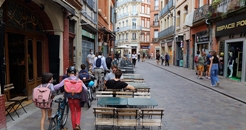 What happened when France sent children from low-income areas to wealthy area schools?
What happened when France sent children from low-income areas to wealthy area schools?
From an article in Reasons To Be Cheerful
Maxence Arcy migrated from Morocco to France in search of work in 1984. In 2004, limited by budget, he moved with his family to Bellefontaine, a poor suburb of the French city of Toulouse. The catchment schools had the worst educational record in the region.
In January 2017, local authorities closed those schools in France’s fourth biggest city and instead bussed the 1,140 affected pupils to high-achieving facilities in the prosperous downtown in an attempt to write a new chapter of education equality.
The theory, according to Georges Méric, president of the Haute-Garonne region that includes Toulouse, was that “a rising tide lifts all boats.” Put another way, by inserting the students into schools of proven success, social determinism would be countered and all children would benefit.
“There are districts in Toulouse with 90% to 95% immigrant populations,” says Georges, who helped develop the scheme. “They are very poor and opportunities are hard to come by. But the young children living there have the right to success in life.”
Under the project, buses take the pupils - aged 11 to 15 - to nearly a dozen different schools in the city centre in journeys that take less than an hour. The school principals and teachers are supported by six “social mix masters” who help facilitate logistics such as transport and tackle any problems that arise, such as dealing with parent concerns.
Five years on, the test results have been noteworthy. Before the bus scheme began, the drop-out rate for students living on the estates after taking the Brevet - France’s national diploma for 15-year-olds - was almost 50%. That rate has now fallen to less than 6% and grades have risen by nearly 15% on average. Some 94% of pupils have stayed in the same school, calming fears that the scheme would lead wealthier families to move their children into the private sector.
“The welcoming colleges had a very good academic level already, that was important,” says Georges. “It’s worked very well. There has not been segregation in them and it’s promoting the wider acceptance of diversity across the city.”
Maxence Arcy’s 13-year-old son, Adam, who switched from a Bellefontaine school to one in Saint Aubin, has had few issues to date, “He’s mixing with other students. He’s happy, he has improved his grades. He wants to be an engineer.”
One crucial learning from the scheme has been the need for extensive dialogue between all parties involved. As many as 80 meetings, including 50 public meetings, were held before the bussing project was launched, helping address the concerns of those who voiced opposition to the project.
The project is here to stay. Already this year two new schools have been built away from the estates’ traditional catchment areas in other, more privileged parts of Toulouse to ensure permanent social mixing in the classrooms and promote a more diverse staff.
Encouraged by the results, several other cities and towns across France are now studying ways to launch their own initiatives.
Read the full article here.
Retweet about this article:
From an article in Reasons To Be Cheerful, 24/08/2022